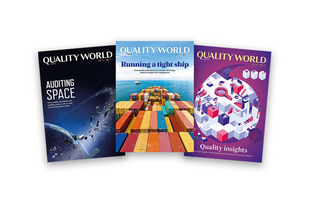
Five tips for maintaining a management system in your supply chain
Progress indicator

Steve Coles explains some of the skills professionals need to improve their management system and the supply chain in their organisation.
There is more to maintaining the management system in a supply chain than employing the standards.
Understanding key leadership behaviours can boost stakeholder engagement and help foster a culture of evaluation and continuous improvement. This is crucial for making sure the supply chain is running smoothly.
Here, Steve Coles, CQP FCQI, consultant and auditor at SBC Consultants and chair of the CQI Scotland branch, explains some of the skills professionals need to improve their management system and the supply chain in their organisation.
1. Develop a customer-centric point of view
SC: "ISO 9001 certification does not guarantee a supplier can provide what the customer needs. You must build relationships with stakeholders to understand what they need – you have to develop the skills to appeal to customers.
"When third-party certification was first introduced, certification was necessary for auditors to become part of bid lists. Certification levelled the playing field but it also meant the customer was eliminated when determining suitability and this removed a rich source of performance history."
2. Be a systems thinker
SC:"As quality professionals, we have to look across the whole business to promote the point of view of the customer and engaging all stakeholders is critical. Problems arise when we solely rely on a third-party audit and remove the customer’s voice."
3. Work with the regulator to understand customer needs
SC: "Developing the skills to engage customers can be a daunting task. Regulators and assessment organisations set out guidelines to help you to understand what the customer wants.
"In some sectors, such as aerospace or medical devices, the regulators establish the customer’s needs. In others they are reached by consensus between the major players. Purchasers hold the most influence but supplier voices are not overlooked."
4. Understand the needs of all stakeholders
SC: "In the oil and gas sector an assessment organisation was set up called First Point Assessment Limited (FPAL). By taking all of their stakeholders into account the organisation has helped purchasers to save significant costs in the early bid stage by sharing the pre-qualification costs between them."
5. Use customer-specific audits in an innovative way
SC: "The system FPAL employs does not eliminate customer specific audits. Instead, the organisation uses the information gathered in the audit to focus on job specific areas, while confident the underlying systems in the organisation will support the stakeholders and the purchasers.
"Even the shared assessments try to avoid repetition where a supplier is already third-party certified, building upon the confidence already established through good stakeholder engagement."
Learn more
CQI and IRCA members can read more about these issues in the May 2016 edition of Quality World and learn more about management systems and the supply chain with training at the CQI.
Member only

This article is free to access for a limited time only. Only CQI and IRCA members receive access to all content.